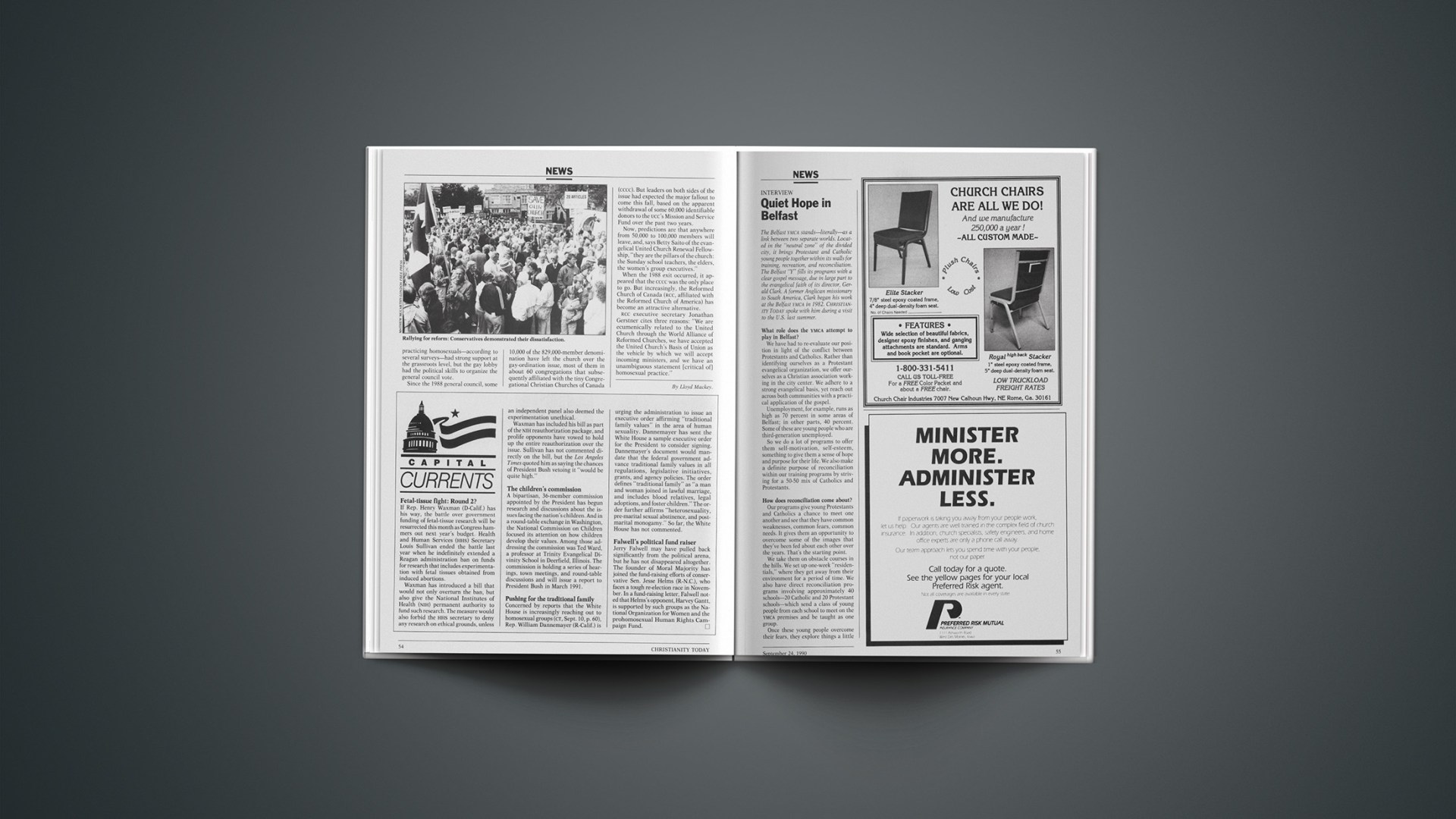The Belfast YMCA stands—literally—as a link between two separate worlds. Located in the “neutral zone” of the divided city, it brings Protestant and Catholic young people together within its walls for training, recreation, and reconciliation. The Belfast “Y” fills its programs with a clear gospel message, due in large part to the evangelical faith of its director, Gerald Clark. A former Anglican missionary to South America, Clark began his work at the Belfast YMCA in 1982. CHRISTIANITY TODAY spoke with him during a visit to the U.S. last summer.
What role does the YMCA attempt to play in Belfast?
We have had to re-evaluate our position in light of the conflict between Protestants and Catholics. Rather than identifying ourselves as a Protestant evangelical organization, we offer ourselves as a Christian association working in the city center. We adhere to a strong evangelical basis, yet reach out across both communities with a practical application of the gospel.
Unemployment, for example, runs as high as 70 percent in some areas of Belfast; in other parts, 40 percent. Some of these are young people who are third-generation unemployed.
So we do a lot of programs to offer them self-motivation, self-esteem, something to give them a sense of hope and purpose for their life. We also make a definite purpose of reconciliation within our training programs by striving for a 50–50 mix of Catholics and Protestants.
How does reconciliation come about?
Our programs give young Protestants and Catholics a chance to meet one another and see that they have common weaknesses, common fears, common needs. It gives them an opportunity to overcome some of the images that they’ve been fed about each other over the years. That’s the starting point.
We take them on obstacle courses in the hills. We set up one-week “residentials,” where they get away from their environment for a period of time. We also have direct reconciliation programs involving approximately 40 schools—20 Catholic and 20 Protestant schools—which send a class of young people from each school to meet on the YMCA premises and be taught as one group.
Once these young people overcome their fears, they explore things a little more objectively. And at that point our staff start working on particular issues that have been divisive in the past.
Is there spiritual content as well?
All of our staff are Christians, and as we build a trust and confidence with the young people, they open up with questions, which give us an opportunity to share our faith and bring in a personal, spiritual aspect to their lives. Many of them, although they term themselves as Catholic or Protestant, have no contact with any church. Their Catholic or Protestant identity is more of a tribal identity than a church or a faith.
Has there been opposition?
In a situation such as in Belfast, if you do anything that is different you’re going to draw fire from one side or the other. Some of the evangelical churches would consider that we have stepped away from our evangelical basis by working with Roman Catholics. As an association, we have said that we will take in as full members anyone who is a committed Christian, irrespective of his or her church affiliation. At the moment, we have 50 percent or more of our membership coming from the Roman Catholic community. That’s a big change from several years ago.
Do you also receive criticism from Roman Catholics?
Very little. They have been open and willing to work with us.
Why the negative evangelical reaction?
I think evangelicals are more fearful that their situation is going to be weakened through any contact with Roman Catholics. And I can see that as a legitimate fear [for the Protestant minority]. But as long as our relationship with God is strong and we are doing what he wants us to do, he will continue to strengthen us for the task.
The situation in Northern Ireland seems to be at a stalemate. Do you see any movement, positive or negative?
I see progress. We still have troubles in areas of the city, like any city. But Belfast is by and large peaceful. People are going about their business in a normal way. The shops and restaurants are open late at night. We’ve seen marked improvements in the liberty of movement within the city. The body searches before you go into shops or before you enter certain parts of the city have all gone. Everything is much more relaxed.
I’m also encouraged by the growth of many small, nondenominational Christian fellowship groups. They involve both Roman Catholics and Protestants coming together in fellowship, and from an evangelical point of view. And they are prepared to work within the city.
But having said that, the tensions are there. The polarization of the Protestant and Catholic communities continues. We still have a concrete wall dividing them. It will take a long time to create confidence again between communities.
What’s going to happen in the next five years?
I think the struggle will go on. We will continue to see evidence of the tension. And we will continue to see a purging within the church, as God calls his people to respond to the needs of those around them. But there is evidence that increasing numbers of people are prepared to come forward in answer to God’s call. For that reason, I see the years ahead as ones of hope and not of despair.










